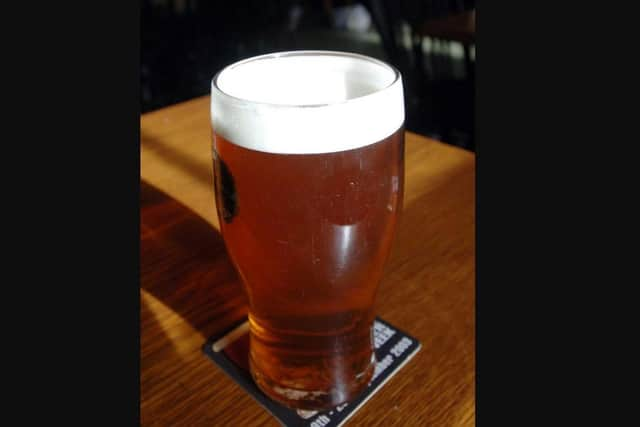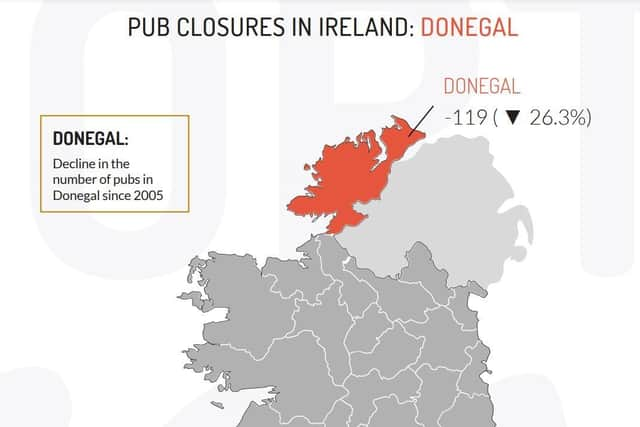Donegal lost 119 pubs with 33 closures over COVID-19
and live on Freeview channel 276
There were 33 closures during the COVID-19 pandemic in Donegal.
'The Irish Pub: Stopping the Decline', commissioned by DIGI and completed by Anthony Foley of the Dublin City University Business School, reveals the number of pubs in Donegal declined by 119 from 453 in 2005 to 334 in 2021 - 26.3 per cent drop.
Advertisement
Hide AdAdvertisement
Hide AdThe COVID-19 pandemic inflicted significant damage to the pub trade in the county, the report shows.


In 2019 there were 367 pubs in Donegal but this had fallen by 33 to 334 last year - a nine per cent decline.
The only counties in the south that suffered a higher rate of decline over the past decade-and-a-half were Leitrim (26.4%), Limerick 29.1%), Longford (25.7%), Mayo (25.1%), Offaly (29.9%), Roscommon (28.3%), Tipperary (26.3%) and Laois (30.6%).
Across the 26 counties there was a 21% decline. There are now 1,829 less pubs than there were in 2005 - 349 closed during the Covid period.


Advertisement
Hide AdAdvertisement
Hide AdPaul Clancy, a DIGI member and CEO of the Vintners' Federation of Ireland, described the report as ‘alarming.’
“1,829 rural pub closures represent businesses that provide jobs, a hub in the local community for socialising and community integration and a cultural centre which has long been documented as among the main attractions for tourists visiting Ireland.
"The pace of decline increased as a result of the Covid-19 pandemic which saw the drinks and hospitality industry suffer the worst of all, with one of the longest lockdowns recorded globally.
“Considering this sharp decline and trend we’re witnessing, we need to monitor this industry carefully and ensure all the necessary supports are in place to contribute to stopping this trend. Our high alcohol excise tax is a cost and slows the growth of these businesses and impacts their day-to-day operations and bottom line.
Advertisement
Hide AdAdvertisement
Hide Ad"Exasperated currently with inflation and the cost of living. We are calling on the Government to reduce excise tax to support the industry with meaningful measures that will be felt immediately and reduce costs over night for tens of thousands of business owners", said Mr. Clancy.
The author of the report Dublin City University (DCU) Associate Professor Emeritus and economist Anthony Foley says the decline in the number of pubs combined with decreases in the number of post offices, full bank branches, Garda stations, local shops and other services and facilities, raises questions about the commercial capability of small towns and villages with large levels of commercial building vacancy.
According to the analysis, Foley suggests there is likely to be a negative social impact arising from the trend and extent of closures, especially in rural and remote areas in Ireland.
Foley cites a number of reasons for the decline including non-replacement of pub operators on retirement or death, low levels of business volume and economic sustainability, regulatory changes such as tighter drink driving laws and enforcement allied with weak or non-existent public transport and population change and distribution, among others.
Advertisement
Hide AdAdvertisement
Hide Ad“There is likely to be a negative social impact arising from the closure of the 1,829 public houses between 2005 and 2021. Pubs serve as a vital social outlet for many people, particularly in rural Ireland.
"With people living there faced by the spectre of rural decline, preserving the cultural heritage of the Irish pub in Ireland is arguably a progressive course of action. Economic and business sustainability is one of the several determining factors of closures of small public houses.
"Addressing high excise would have a positive effect on the commercial sustainability of small public houses and would be a strong element in the wider policy strategy to support rural areas. It is a measure which is completely within the scope of Government," said the academic.
Comment Guidelines
National World encourages reader discussion on our stories. User feedback, insights and back-and-forth exchanges add a rich layer of context to reporting. Please review our Community Guidelines before commenting.
